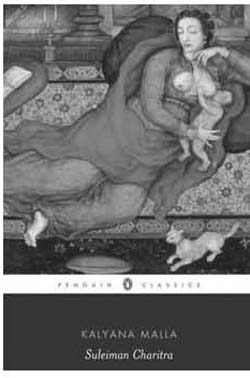Suleiman Charitra is a truly amazing little book. A short work in Sanskrit from the 16th century, it’s title should be enough of a clue to even the casual reader about its hybrid nature. It is a perfectly synthetic work that, on the surface, tells a story from the Semitic tradition in the form of a classical Sanskrit narrative—the Charitra, i.e., the acts of a great man who might be a king, a hero, or even a god. But below the surface, there are currents and eddies, perhaps even whirlpools, that sweep us off our feet and away into an unexpected story land.
The Suleiman of the title is Solomon, the last king of a united Israel, a prophet in both the Christian and Islamic traditions, but the Suleiman Charitra is more about his father, the Biblical David, here called Dawood. The text was apparently composed for and in the Lodhi court, so one can understand that the hero of the Charitra would be someone that a Muslim ruler would regard as significant. What is interesting is that rather than providing an exemplar, a portrait of a more traditional ‘hero’ as a warrior or a great king or even as a man of faith, Dawood is presented as a lover, a man besotted with the wife of another. So although the text evokes a heroic narrative in its title, it is actually a love story, recalling the Turkic masnavi. There are also traces of the Persian nameh and the last section of the work presents us with a set of framed stories from the Arabian Nights. Thus, this tight and punchy composition is truly an amalgam of the literary traditions that either grew in or reached the subcontinent over the centuries. As if all these genres and forms and attitudes nestling together were not enough, here’s how the Suleiman Charitra opens.
‘There was once a king of Ayodhya. In splendour and prowess, he was like Balabhit, that Indra, the king of the gods. No other ruler could compare with him. Learned and knowledgeable, brave and devoted to public welfare, he was the famous king Ahmad, always kind and merciful, a bright jewel in the Lodhi line’ (p. 3). Ahmad’s son, Lad Khan, commissions the poet Kalyana Malla (composer of the erotic treatise Ananga Ranga) to write the story of Suleiman and his father in ‘that same divine language’, i.e., Sanskrit, so that it would give pleasure to its readers and listeners as well as ‘exterminate their sins’. Kalyana Malla launches into his tale of Suleiman’s infatuation telling us that it happened sometime between the Dwapara and Kali Yugas. References to Rama and Sita and Ravana add a judicious context to story and character and the codicil to chapter three likens Lad Khan to Karna.
Dawood is a good and wise king whose kingdom has been attacked by wicked demons. A secret destiny ensures that he does not join the battle but instead, sends his best soldiers and most skilled and trusted commanders to defeat the enemy. As Dawood whiles away his time at home, he sees the most beautiful woman in the world from his palace terrace. Smitten, nay, maddened by the sight of her peerless beauty, the king decides that he must have her, even if she is the wife of another man. That other man happens to be Dawood’s very own general, fighting far away to save his lovelorn master’s kingdom. The good wife, Saptasuta in our story but known to the rest of the world as Bathsheba, initially spurns the King’s advances.

